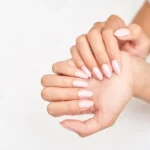Learn how to stop biting nails with 9 easy and effective tips to break the habit for good and grow healthier, stronger nails.
Do you find yourself biting your nails without even realizing it? One moment your hands are just hanging out, and the next—you’re down to stubs. If that sounds familiar, don’t worry, you’re not alone! Nail biting is one of those habits that’s hard to break, but with a little patience and some clever tricks, you can stop nail biting for good. Let’s break down why you do it and how to kick the habit once and for all.
You may also like: Top Vitamins and Supplements for Strong, Healthy Nails!
You may also like: How to Make Your Nails Grow Faster Naturally: 10 Proven Tips for Stronger Nails
Nail Biting Causes: Why Do We Bite Our Nails?
Nail biting isn’t just about having uneven nails—it’s often tied to how you’re feeling. Here are some common reasons why people bite their nails:
✅ Stress and Anxiety – Biting your nails can be a way to cope with stress or nervousness. It gives your hands something to do when your mind feels overwhelmed.
✅ Boredom – When you’re not mentally engaged, you might find yourself biting your nails just to pass the time.
✅ Perfectionism – Noticing a rough edge or uneven nail might make you feel like you need to fix it—by biting.
✅ Habit – If you’ve been biting your nails for years, your hands probably go to your mouth without you even realizing it.
Understanding why you bite your nails is the first step to breaking the cycle. Now let’s talk about how to stop it for good.
How to Stop Nail Biting?
1. Identify Your Triggers
The key to quitting any habit is understanding what sets it off. Do you bite your nails when you’re stressed? Bored? Watching TV? Start paying attention to when and why it happens.
👉 Tip: Keep a small notebook (or use your phone) to track when you bite your nails. Patterns will start to emerge!
2. Keep Your Nails Short and Neat
Long, ragged nails are more tempting to bite. Keeping them trimmed and shaped reduces the urge to “fix” them with your teeth.
👉 Tip: Give yourself a mini manicure once a week to keep your nails looking clean and polished. If there’s nothing to bite, you’ll be less tempted!
3. Use a Bitter-Tasting Nail Polish
This is one of the most effective tricks. There are special nail polishes designed to taste awful—so when you go to bite, you’ll immediately regret it. It’s a quick way to create a negative association with nail biting.
👉 Tip: Look for a non-toxic formula that also strengthens your nails while you’re at it.
4. Find a Replacement Habit
If you’re biting your nails to cope with stress or boredom, you’ll need to replace the habit with something else.
- Chew gum
- Squeeze a stress ball
- Play with a fidget toy
- Tap your fingers or rub a textured object
👉 Tip: Keep a small fidget toy in your pocket or purse so you have something to do with your hands.
5. Moisturize Your Nails and Cuticles
Dry, brittle nails and rough cuticles can trigger the urge to bite. Keeping them soft and moisturized makes them less tempting.
👉 Tip: Apply cuticle oil or hand cream daily. Keep a small bottle at your desk or bedside table for easy access.
6. Wear Nail Polish or Fake Nails
Wearing nail polish or applying fake nails (like press-ons or gel) can create a physical barrier that makes it harder to bite. Plus, if your nails look pretty, you’ll be less inclined to ruin them!
👉 Tip: A clear, strengthening top coat works well if you prefer a more natural look.
7. Cover Your Nails Temporarily
If you struggle with subconscious nail biting, try covering your nails with bandages or wearing gloves at home. It creates a physical barrier that prevents you from biting without thinking about it.
👉 Tip: Try wearing a cute set of fingerless gloves when you’re watching TV or working at your desk.
8. Reward Yourself for Progress
Quitting nail biting is tough, so give yourself credit when you’re making progress!
- Made it a week without biting? Treat yourself to a new nail polish or hand cream.
- Two weeks? Maybe a mini spa day or a coffee date with a friend.
👉 Tip: Small rewards keep you motivated and remind you that your effort is paying off.
9. Be Patient with Yourself
Breaking any habit takes time. If you slip up, don’t beat yourself up—just refocus and keep going. Progress isn’t always linear, but each day without biting brings you closer to stronger, healthier nails.
👉 Tip: Celebrate small wins like growing out your nails or noticing smoother cuticles. Every step forward counts!
You’ve Got This!
Nail biting might be a tough habit to break, but it’s totally possible with a little effort and some smart strategies. Start by identifying your triggers, keeping your nails clean and polished, and using tricks like bitter polish and stress toys to help you stay on track. The more consistent you are, the easier it gets.
💬 Have you struggled with nail biting? What helped you stop? Drop a comment below and share your experience! 👇
Nail biting is often triggered by stress, boredom, or habit. To stop, try using bitter nail polish, keeping your nails short, and finding a replacement habit like fidgeting with a stress ball.
The fastest way to stop biting nails is to apply a bitter-tasting nail polish and keep your nails trimmed and moisturized. Replacing the habit with chewing gum or using a fidget toy can also help.
Yes, excessive nail biting can weaken your nails, cause uneven growth, and lead to infections. Consistent care and moisturizing can help reverse the damage over time.
It typically takes 21 to 30 days to break a habit. Staying consistent with strategies like bitter polish, fidget toys, and nail care increases your chances of success.
Yes, stress is a common trigger for nail biting. Managing stress through relaxation techniques, exercise, and mindfulness can help reduce the urge to bite your nails.
Nail biting can lead to nail infections, damage to the nail bed, and increased risk of transferring bacteria and germs to your mouth, which can cause illness.
Yes, biting your nails can cause chipped teeth, jaw pain, and misalignment over time due to the pressure applied to your teeth and jaw.
Nail biting is often linked to anxiety, stress, and perfectionism. It acts as a coping mechanism to relieve tension or nervous energy.
Yes, using bitter-tasting nail polish, keeping your hands busy with stress balls or fidget toys, and soaking nails in coconut oil or lemon juice can help reduce nail biting.
In some cases, chronic nail biting (onychophagia) can be linked to anxiety, stress, or obsessive-compulsive tendencies. If it becomes severe, consulting a therapist may help.
Yes, wearing nail polish (especially bitter-tasting or gel polish) can create a physical barrier and make you more aware of the habit, helping to reduce nail biting.
Yes, applying acrylic or gel nails can make it harder to bite your nails and help break the habit over time.



